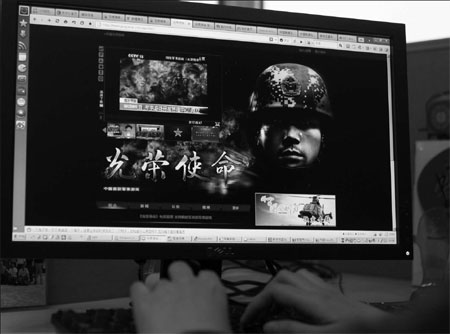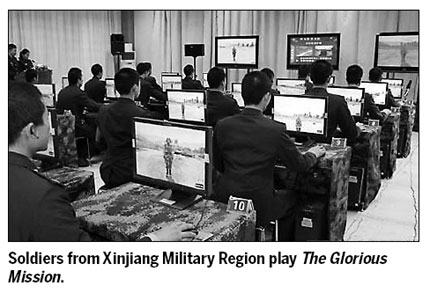'Red' games hit the mark
Updated: 2011-12-31 09:17
By Eric Jou (China Daily)
|
|||||||||
 |
|
The PLA training game The Glorious Mission is scheduled to be released by May 2012. Zhu Xingxin / China Daily |

The PLA-developed war simulation game The Glorious Mission is likely to be publicly released in 2012, underlining the trend for more red games. Eric Jou reports.
The Red Guard and the People's Liberation Army (PLA) are on the march again, but this time in cyberspace with The Glorious Mission.
The Glorious Mission, a first-person shooter war simulation game made for and by the PLA, made headlines earlier in 2011 as the first video game training simulation for China's armed forces.
Its publicly released trailers and game play videos have got gamers on Sina Weibo and other social media sites drooling with anticipation for a public release.
At the Game Developers Conference in Shanghai (GDC Shanghai) in November, a marketing executive surnamed Zhang at Wuxi Giant Network Technology Inc, co-developer of The Glorious Mission along with Nanjing Military Command, said The Glorious Mission would be released by May 2012.
"We're waiting for approval before we formally release the game to the public," Zhang said. "Right now it's only open to the military.
"It'll probably take another six months, after some alterations, before it can be released."
While Chinese gamers await the release of The Glorious Mission, the PLA themed first-person shooter is by no means the only "red" game on the market. These go as far back as the beginning of video gaming in China, says Yu Yi, an analyst with Analysys International.
"China's Internet gaming sector is still growing and this includes red gaming. This is particularly true with those younger than 18, and over 35, as they are introduced to the Internet," Yu says.
"In terms of red games, the growth of the 35-plus age group is potent, because many are nostalgic for stories about the Red Guard and the PLA."
Yu says that there are two different styles of red games: serious games such as The Glorious Mission, and simple games that cater to the historical fantasies of players, much like the martial arts-style games.
Yu breaks down the domestic online game market into three major areas according to market share: kungfu fantasy games, mystical fantasy games, and red games.
Red games are still a minor genre compared with the other two, Yu says.
Simon Chang, an instructor at the Digital Arts School of Peking University, says the gaming industry as a whole tried to avoid the Red Army and PLA theme because they are sensitive subjects.
"Martial arts are a safer area and are great when combined with history. But as you can see, there are too many of them in the market," Chang says.
"Modern era games are definitely a good direction to go in, but because of the sensitivity I guess most gaming industry people are trying to avoid this direction."
Chen Yuanzheng, a game designer based in Beijing, says there are too many variables when it comes to making red games.
"We don't make red games, because if we were to make one, it would have to be a single-player game in which the player takes the role of someone from the Red Army or PLA," Chen says.
"If we were to make a multi-player game about the PLA, the PLA could not lose. You couldn't have, say, the Japanese army beat the PLA."
"Also if we make single player action, adventure, or role playing games involving the Red Army or PLA, we won't make any money because of piracy."
While red games are generally not the most popular, companies such as ZQGames constantly churn out more of them and there are red games being adapted and developed for mobile devices such as the iPad.
Event planner Xu Chongtao, 25, says he plays red games because they are growing in popularity and they are the "thing to do right now."
"They just caught my interest," Xu says. "I started playing the games and I got hooked. I'm really interested in the history and the games provide a fun and interesting way to interact with history."
Xu has recommended the games to his friends, hoping they will increase the popularity of red games.











